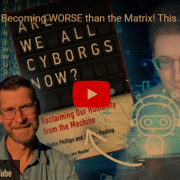In the video below, Pulitzer Prize finalist Nicholas Carr shares evidence from brain science about what happens when our devices (particularly the smartphones) infuse into our lives perpetual distractibility, multitasking and split attentiveness. He shows that what science is finding (and you can see footnotes to the actual peer-reviewed studies in Carr’s book The Shallows) is that there is a trade-off whereby certain cognitive functions become diminished.
That much isn’t surprising, but what I found really interesting is which cognitive functions are compromised.
In addition to the neurological liabilities we might expect (i.e., things like heightened distractibility, inability to attend to any one thing for long periods of time, an insurance policy against ever having to be bored or mentally quiet) the research is also showing that exposure to continual streams of information diminish the following mental functions:
- Conceptual thinking;
- Big picture thinking;
- Contextual thinking;
- Ability to make unexpected connections between ideas and facts.
In Carr’s book (which I summarized in my article ‘The Dangers of Digital Addiction and Information Overload’) he adds to these concerns by citing research that the brain’s ability to grasp over-arching narratives of meaning (what neuroscientists call “schemas”) is atrophied through exposure to too much information, so the brain essentially becomes lost in a sea of particulars without the ability to connect those particulars into larger structures of understanding, or to apply principles across multiple contexts.
Another mental function that becomes diminished the more we use smartphones is actually the ability to multitask well, since researchers at Stanford found that multitasking falls into a weird class of behaviors where the more you practice it the worse you become at it. The study also found that frequent multitasking makes a person “more susceptible to interference from irrelevant environmental stimuli and from irrelevant representations in memory.” Far from becoming better multitaskers, we are actually becoming worse at it while thinking we are becoming better.
One of the things I appreciated about Nicholas Carr’s video is that he is not saying we need to get rid of these technologies and the benefits they bring, but that we need to create processes designed to mitigate the trade-offs.
Further Reading


